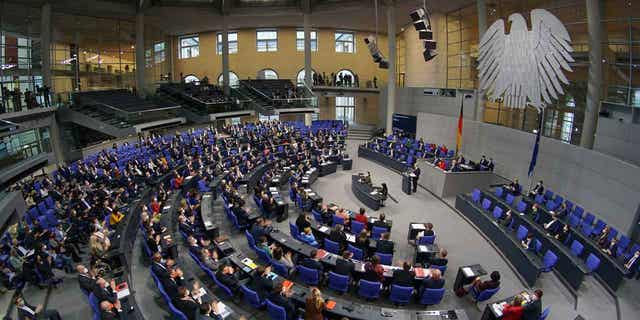close 
Fox News Flash top headlines for March 17
Fox News Flash top headlines are here. Check out what’s clicking on Foxnews.com.
Lawmakers in Germany approved electoral reforms Friday that would reduce the size of the country’s increasingly bloated parliament, but two opposition parties were vehemently critical and the plan is expected to face a court challenge.
Parliament’s lower house, or Bundestag, currently has a record 736 members. The changes approved on a 400-261 vote with 23 abstentions would reduce that number to 630.
Other proposals to reform the system have failed in recent years because of the difficulty of reconciling parties’ interests. Germany’s next national election is expected in the fall of 2025.
In German elections, every voter gets two votes: one for a directly elected candidate, the other for a party list.
GERMANY NEEDS STEP UP AGAINST RUSSIA AND START PULLING ITS WEIGHT IN UKRAINE
Each of the country’s 299 constituencies elects its legislative representative directly by a simple majority vote. At least 299 further seats go to candidates elected on party lists. The list votes are critical because they determine the percentage of seats each party wins.
At present, if a party wins more seats via the direct vote than it would get under the party vote, it keeps the extra seats — but more seats are added for other parties to ensure the proportional vote is reflected accurately.

German Chancellor Olaf Scholz delivers a speech during a meeting of the Bundestag at the Reichstag building in Berlin, Germany, on Dec. 15, 2021. German lawmakers approved a reform of the country’s voting system that would reduce the size of the parliament. (AP Photo/Michael Sohn, File)
Because Germany’s traditional big parties have continued to dominate the direct vote even as their overall support has declined, that can result in the Bundestag having many more lawmakers than the minimum 598.
To share in the division of seats, a party must win 5% of the party list vote or have at least three directly elected lawmakers.
UK, GERMANY SCRAMBLE FIGHTERS TO BLOCK RUSSIAN JETS HOURS AFTER US DRONE CRASH
The reform drawn up by Chancellor Olaf Scholz’s governing coalition would set the size of the Bundestag at a constant 630 seats.
“The people of our country … expect us to be capable of reform, and to show that we, too, are prepared to accept cutbacks,” said Dirk Wiese, a lawmaker with Scholz’s Social Democrats.
Under the new system, parties would have to win 5% of the vote to share in the division of seats and the three-winner option would be eliminated. And no extra seats would be added to allow all direct constituency winners to take their seats, meaning that the worst-performing candidates could miss out.
That has incensed two opposition parties in particular: the conservative Christian Social Union, which runs only in Bavaria and holds nearly all that state’s 46 directly elected seats; and the Left Party, which fell short of 5% support in the 2021 election but has a full parliamentary group because it emerged with three directly elected lawmakers.
CLICK HERE TO GET THE FOX NEWS APP
“You set out to shrink the German parliament; what you’re doing now is shrinking the opposition in this parliament,” Alexander Dobrindt, the CSU’s top lawmaker in Berlin, said.
The center-right bloc that includes the CSU made clear that it intends to take the matter to Germany’s Federal Constitutional Court.
